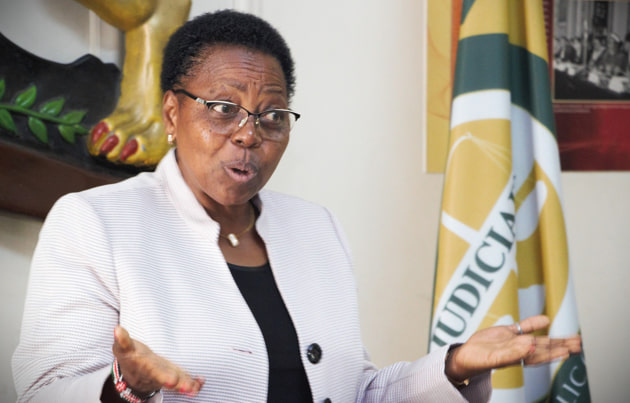STATEMENT ON THE COMMEMORATION OF THE 2024 INTERNATIONAL DAY OF THE WORLD’S INDIGENOUS PEOPLES
The National Gender and Equality Commission joins Kenya and the world at large in commemorating the International Day of the World’s Indigenous Peoples (IDWIP). This day is marked every year on the 9th of August to raise awareness of the needs of Indigenous peoples.
The theme for 2024 is "Protecting the Rights of Indigenous Peoples in Voluntary Isolation and Initial Contact."
Indigenous peoples in voluntary isolation and initial contact represent some of the most vulnerable populations in the world. These groups, often residing in remote and hard-to-reach areas, choose to live with minimal or no interaction with the outside world to preserve their unique cultural identities, traditional lifestyles, and autonomy[1]. Protecting their rights is not only a matter of human dignity but also a legal and ethical imperative recognized by various international and regional conventions including the Universal Declaration of Human Rights (UDHR), and African Charter on Human and Peoples' Rights (ACHPR) and human rights organizations.
In Kenya, indigenous peoples include a diverse array of communities, each with unique cultural practices, languages, and lifestyles. While there are no documented cases in Kenya of Indigenous peoples in voluntary isolation similar to those in the Amazon or Papua New Guinea, certain communities live in relative isolation, maintaining traditional lifestyles and minimal contact with the broader society. These communities fall within the broader provision within the Constitution of Kenya, specifically Article 260. They are the marginalized communities, that include pastoralist communities, hunter-gatherer groups, and fisherfolk communities. These communities suffer violations of land rights, cultural degradations, and social, economic, and political marginalization[2].
Kenya has made significant strides in recognizing and protecting the rights of Indigenous peoples through legal and policy frameworks, programmatic interventions, and in some cases affirmative actions. Articles 56 and 63 of the Constitution of Kenya 2010 guarantee special opportunities for these groups in education, employment, and cultural development while recognizing community land rights. The Community Land Act 2016 provides for the recognition, protection, and registration of community land rights, and further empowers such communities to manage their land according to customary laws. In addition to these national frameworks, Kenya is a signatory to the United Nations Declaration of Human Rights, and the African Charter on Human and Peoples' Rights that places indigenous people at the centre of human development.
It is a fact that Indigenous Peoples in Kenya continue to face unique challenges often overlooked by the State, the private sector, and the dominant communities[3]. Developments for agriculture, mining, tourism, and natural resource extraction in their territories for example may result in deforestation of large swathes of Indigenous forests. Major infrastructure development disrupts their way of life and often harms the natural environment which is a source of their livelihood. These communities are susceptible to external threats such as land encroachment, climate shocks, and unstainable resource exploitation. Such actions undermine their traditional knowledge and cultural practices thus endangering their existence.
As we commemorate this day, the National Gender and Equality Commission invites the Government, civil society, the private sector, and the international community, to relook into Cancun Principles and renew commitments to investing in greater protection and promotion of the fundamental rights of the indigenous peoples. Such investment must be deliberate and directed to among others, providing access to inclusive education, healthcare, and livelihood opportunities within the territorial spaces of the indigenous peoples. Any development opportunities among this population must be transformative, aim at preserving cultural heritage and traditional practices, and demonstrate contributions/inputs of indigenous peoples.
We urge the Government of Kenya to put in the necessary mechanisms to facilitate the development and implementation of a national policy and legislative framework for the integration of ethnic minorities and marginalized communities including indigenous peoples in Kenya as per the Constitution of Kenya,2010.
The National Gender and Equality Commission reaffirms its commitment to promoting gender equality and freedom from discrimination for all persons including indigenous peoples and marginalized communities in Kenya.
SIGNED
Dr. Joyce M. Mutinda, PhD, EBS
CHAIRPERSON
[1] https://desapublications.un.org/un-desa-voice/more-from-undesa/july-2024/protecting-rights-indigenous-peoples-voluntary-isolation
[2] National Gender and Equality Commission (NGEC). (2023). A scoping review: A National Inclusive Development Framework for Marginalized Communities in Kenya.
[3] Kenya National Commission on Human Rights. (2019). The right to own: Indigenous people and the right to land in Kenya. Kenya National Commission on Human Rights ; the United Nations Human Rights Council. (2018). Report of the Special Rapporteur on the rights of Indigenous Peoples on her mission to Kenya (A/HRC/39/17/Add.3). United Nation; Amnesty International. (2020). The state of the world’s human rights: Kenya 2020. Amnesty International.


Comments